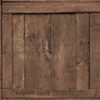Leyland James Kirby, "Sadly, The Future Is No Longer What It Was"
 This ambitiously sprawling triple album marks the beginning of a third phase in James Kirby's career. The haunted murkiness of his previous work as The Caretaker remains intact, but Kirby has recently made the bold (and possibly ill-conceived) move of playing everything himself and entirely avoiding samples. The result is certainly quite strange and difficult, but it is also a gutsy rejection of all prevailing trends in contemporary music.
This ambitiously sprawling triple album marks the beginning of a third phase in James Kirby's career. The haunted murkiness of his previous work as The Caretaker remains intact, but Kirby has recently made the bold (and possibly ill-conceived) move of playing everything himself and entirely avoiding samples. The result is certainly quite strange and difficult, but it is also a gutsy rejection of all prevailing trends in contemporary music.
History Always Favours the Winners
The most immediately apparent thing about Sadly, The Future is No Longer What It Was is its sheer, impenetrable immensity. There’s over three hours of material and I have tried and failed for several months to make it through the entire thing in one sitting. The futility of that endeavor was compounded by the album’s other noteworthy attribute: all the tracks all blur together in a gray fog of gloom and emptiness. That is not entirely a failing, which is where things get complicated. As a listener, I am definitely bored by the lack of “hooks” or differentiating characteristics and feel very strongly that one album could have conveyed everything here without anything being lost. However, it seems like Kirby set out to create an overwhelming and elephantine void of loss, hopelessness, and alienation: an artistic goal that he seems to have met with a stunning degree of success. This album is not enjoyable or engaging at all and probably never will be, but it might be years ahead of its time. This is post-everything; nothingness made extreme: the sort of music that I can only envision being listened to in a dreary futuristic dystopia populated by soulless automatons.
Obviously, this is a rather singular (perhaps even crazily self-indulgent) work, but Kirby does overtly allude to some influence from others. The most obvious touchstones are the early ambient works of Brian Eno and Harold Budd, manifested most strongly in the watery, quavering tones of Kirby’s synths. The atmosphere here is a grotesque parody of the pastoral minimalism of albums like Music for Airports, as all the familiar elements are there but sound mildewed and soaked with despair. The other apparent inspiration seems to be Angelo Badalamenti, though that may be entirely accidental. While most of the album is vast ocean of rumbling, soft-focus murk, occasionally there are bursts of cheesy, dated-sounding synthesizer melodrama that would not sound at all out of place during a poignant scene in Twin Peaks. Utter blankness and creepy sentimentality make odd bedfellows, but I have no doubt that Kirby acted deliberately (albeit mystifyingly). On a related note, that propensity for melodrama has also infested the song titles, which read like Victorian poetry—an oddly pretentious move for a former V/VM member. They seem weirdly appropriate though, as they add to the sense of dislocation from the present and give the works a vague narrative thread. The titles almost make the album seem like a series of aural paintings.
It took me a very long time to form a lasting opinion of this album, as my initial gut reaction was “this is absolutely awful,” but my fascination with some of Kirby’s previous work gave me a nagging suspicion that something great was happening that I was too dumb or insensitive to appreciate (I have mostly overcome it though). This demands a hell of a lot from a listener and gives proportionally little back in return. In fact, it is hard to imagine this record making any impact at all if an unknown musician had released it. There certainly are some genuinely eerie moments here, such as the creepy carousel music of “And Nothing Comes Between the Sadness and the Screams,” but they have to be listened to both actively and loudly to be appreciated. When I listen to the album at a normal volume, it is merely a droning, vitality-sapping hum that leaves me longing for respite from its edgeless, formless, artificial-sounding enormity. As far as musicality and accessibility are concerned, this is substantial regression for Kirby. As an artistic statement, however, it may actually be kind of brilliant—in its own way, Sadly, The Future is No Longer What It Was might be one of the most uncompromising and non-commercial albums ever made. This probably isn’t a black hole very many people will want to descend into, but it is nevertheless an effort that commands grudging respect.
Samples:
- When Did Our Dreams and Futures Drift So Far Apart?
- When We Parted, My Heart Wanted to Die
- Memories Last Longer Than Dreams



